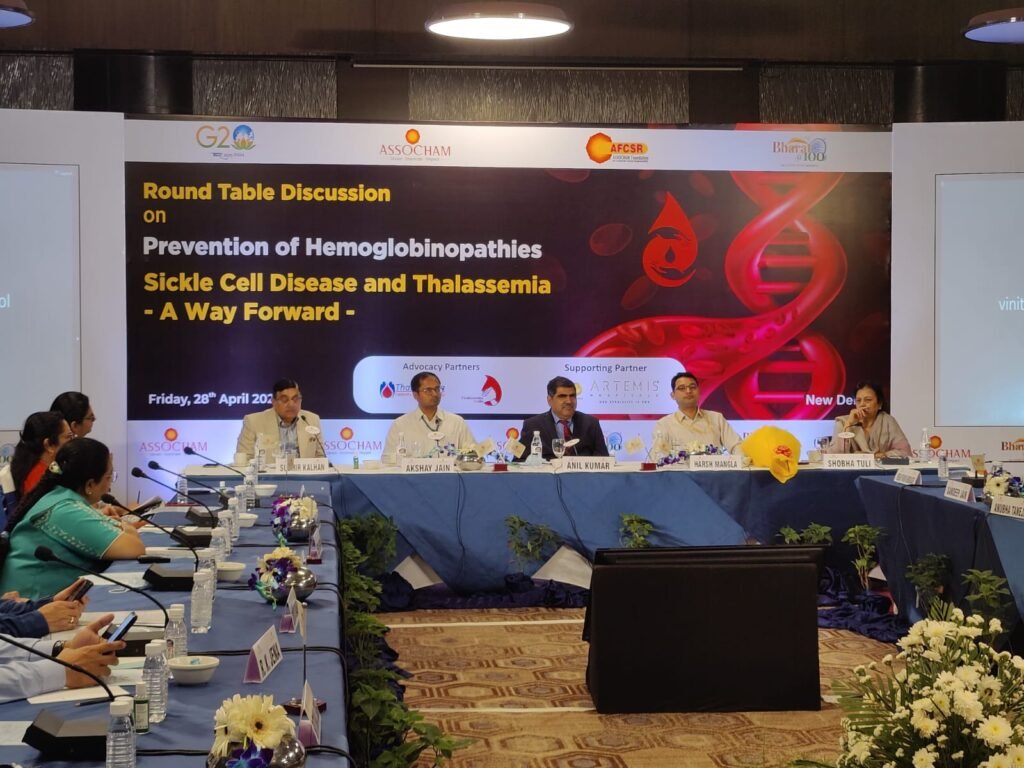Directorate General Of Health Services & National Health Mission pledge Thalassemia & SCD prevention programs at TPAG and ASSOCHAM roundtable

New Delhi, 29th April 2023: With the Government’s sharp focus on the prevention of disabilities like thalassemia, and sickle cell disease, and in the background of the Hon’ble Finance Minister’s recent announcement on eradication of sickle cell disease by 2047. The Thalassemia Patients Advocacy Group (TPAG), in association with The Associated Chambers of Commerce and Industry of India (ASSOCHAM), today hosted a roundtable on the prevention of Hemoglobinopathies – Sickle Cell Disease and Thalassemia at Le Meridien, New Delhi. The event, which saw the participation of eminent policymakers, doctors, and patient bodies, discussed the current practices, challenges, and way forward for the prevention of hemoglobinopathies like thalassemia and sickle cell disease. TPAG, which is a patient body of Thalassemics India, would work with ASSOCHAM to develop a position paper on the topic.
Delivering his inaugural address, Dr. Anil Kumar, Additional Dy. Director General, Directorate General of Health Service, Ministry of Health & Family Welfare, Govt. of India said, “Hemoglobinopathies continue to pose a significant burden on our healthcare system, with limited resources available to address the challenges they present. While DGHS is working on a National level thalassemia control programme, we are equally focused on the management of thalassemia and commit to blood safety through Nucleic Acid Testing (NAT), voluntary blood donation, etc in a phased manner. We aim to release a manual on blood transfusion services and voluntary blood donation guidelines by 14th June which is World Blood Donor Day.”
Welcoming the announcement of Dr. Kumar, Ms. Anubha Taneja-Mukherjee, Member Secretary, Thalassemia Patients Advocacy Group, said, “TPAG has been working for the case of thalassemia since 2017 and would continue to work with the policymakers and bodies like ASSOCHAM to ensure proper awareness about the disorders so prevention can be a reality. We must recognize the significant burden of haemoglobin disorders, including Thalassemia and Sickle Cell Disease, and work towards finding innovative solutions to combat them.”
The special focus of the event was the representation of States by prominent doctors like Dr. Mamta Manglani, Director (Academic & Research), MCGM – Comprehensive Thalassemia Care, Pediatric, Hematology- Oncology & BMT Centre, Mumbai, Dr. Seema Kapoor, Director & Professor, Division of Genetics, Genetic & Metabolic Lab, Lok Nayak Hospital & Maulana Azad Medical College, New Delhi, Dr. Maitreyee Bhattacharyya, DM, Clinical Hematology (AIIMS) and Director, Institute of Haematology & Transfusion Medicine, West Bengal. The session was followed by a panel discussion on the current practices, challenges, and the need of the hour for the screening of Hemoglobinopathies in public and private settings. In the discussion, eminent doctors and healthcare experts like Dr. Ritika Sud, Prof of Medicine, LHMC & SSK Hospital, Delhi, Dr. K Madan Gopal, Sr. Consultant, Niti Aayog, Dr. Hrishikesh D. Pai, President, FOGSI, Dr. Anil Handoo, Lab Director, BLK Hospital, New Delhi, among others, shared their thoughts.
We are now faced with an urgent need to launch a national-level thalassemia programme on the lines of sickle cell disease but with a stricter timeline. In this regard, 2016 guidelines on hemoglobinopathies may need a revision to include novel technologies and unique methods of awareness.
About 10,000 babies with thalassemia major are born every year and over 1.5 lakh people are currently living with the disease in India. Sickle Cell Disease (SCD) is a genetic disorder that is prevalent among the tribal population in India. It has been observed that approximately 1 in 86 births among STs are affected by SCD. In this region where resources are scarce, it is crucial to prioritize disease prevention. The National Health Mission has introduced programs for controlling thalassemia and sickle cell disease, but they have not yet been fully implemented at the grassroots level.

